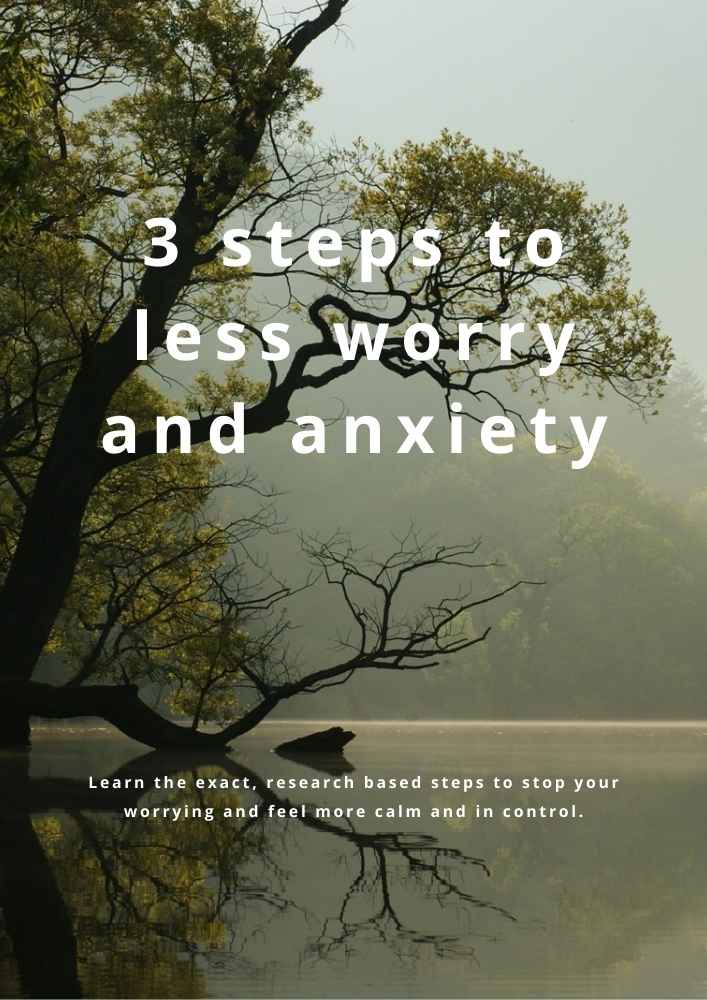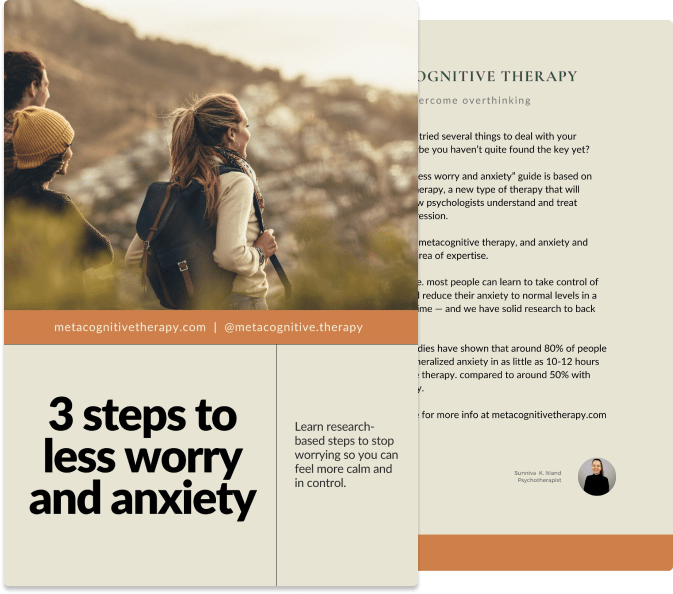What traditional therapy gets wrong about mental health, and the groundbreaking treatment that’s flipping the script

Download our best tips on reducing anxiety and worrying
Learn three powerful metacognitive therapy steps to stop the worry cycle, reduce anxiety, and feel calmer in everyday life.
.jpeg)
.jpeg)
More people are in therapy today than ever before, but the mental health crisis continues to rise. What are we missing in common mental health treatments?
The answer might lie in the outdated assumptions and theories that still shape how we approach psychological treatment. While traditional approaches like CBT and talk therapy have long been considered the gold standard, new research suggests that these methods may focus on the wrong things.
Metacognitive Therapy (MCT) is an evidence-based approach that’s challenging how we understand and treat mental health the same way Cognitive Behavioral Therapy (CBT) disrupted Freudian psychoanalysis in the 70s. Rather than focusing on analyzing or “fixing” specific thoughts, MCT zeroes in on how we relate to them, and the results are changing our understanding of anxiety, depression, and trauma.
So what exactly are traditional therapies getting wrong? Let’s break down some of the most common myths and misconceptions that are keeping people stuck, and how MCT is flipping the script
Myth #1: Negative thoughts are the problem (and must be reframed or analyzed)
Traditional approaches, like CBT, treat negative thoughts as something to fix, replace, or reframe. And talk therapy often encourages people to dig deeper into their negative thoughts to explore the meaning or the source. But negative thoughts aren’t the problem, it’s our engagement with them that causes distress.
Everyone has negative and stressful thoughts on a daily basis, but not everyone develops depression or an anxiety disorder. The issue isn’t the thought, it’s how much time we spend repeatedly thinking about the thoughts that pop up. Those who let these thoughts pass without interfering in them don’t tend to struggle with mental health disorders, whereas those who excessively engage with a negative thought when it occurs (replaying the moment, assigning meaning to it, doubting themselves, worrying about the future) end up fuelling their anxiety and prolonging the distress. In MCT, these unhelpful thinking styles are challenged.
Myth #2: Worrying and rumination are symptoms beyond our control
In traditional therapy, worry is often seen as an uncontrollable symptom of anxiety. But MCT challenges this, viewing worry not as a symptom, but as a mental strategy: Worry isn’t something that just happens to us and it's not out of our control, it’s a habit we engage in to feel safe or in control. The good news? We can change that habit.
This is a profound shift for many people, as it shows them that they have agency over how they think. This empowers them to reduce the time they spend worrying by recognizing that it’s something they’re actively doing, and something that can choose to interrupt.

Download our best tips on reducing anxiety and worrying
Learn three powerful metacognitive therapy steps to stop the worry cycle, reduce anxiety, and feel calmer in everyday life.
Myth #3: Coping strategies like cognitive reframing, breathing exercises, and meditation are the answer
Popular modern therapies often prescribe tools like breathing techniques, positive affirmations, journaling, and meditation to manage distress. These strategies can offer short-term anxiety relief, but they don’t address the root of the problem.
The need for coping strategies is usually created through the process of overthinking, but by shifting our metabeliefs and our relationship with our thoughts entirely, we can interrupt the cycle of overthinking, and remove the need for coping strategies.
Coping strategies can ultimately backfire, too: When we constantly manage our thoughts and feelings with coping tools, we signal to our brain that those thoughts and feelings are dangerous, which keeps us hyper-reactive. When we stop using coping strategies to engage with uncomfortable thoughts and feelings, we discover that these thoughts are transient and don't need to be managed — they fade naturally when we let them pass.
Just like social media algorithms show us more of what we engage with, our brains highlight thoughts we treat as urgent or important, so the more we analyze or manage them, the more they persist. Those thoughts usually become less prominent when we stop “clicking” on them.
Myth #4: Trauma must be processed in order to heal
Perhaps one of the most radical shifts MCT offers is in how it approaches trauma. Traditional models perpetuate the belief that to heal from trauma and mental illness, you must unpack and process the past, exploring and attempting to resolve your trauma in order to move forward.
But there’s no evidence to support this. We don’t need to dissect the past to get better, and for many people, psychoanalyzing past trauma can add to their distress. Clients might feel worse after therapy sessions that involve heavy introspection, continuing to analyze and ruminate at home, creating a cycle that keeps them stuck.
Take PTSD, for example: Most people who experience trauma don’t go on to develop PTSD. The ones who do have PTSD tend to be those who keep reliving and reexamining their trauma, trying to “process” it, or trying to completely suppress it.
In Metacognitive Therapy, on the other hand, we explore how beliefs about trauma (like “I have to heal this before I can be happy again”) can create a self-fulfilling cycle of over-engagement. Many trauma survivors feel trapped between not wanting to think about their trauma as it upsets them, and believing they have to think about it in order to heal.
MCT offers permission to try something different: to not engage, to not ruminate, and to see what happens when you let your mind do what it was built to do: heal naturally.
Myth #5: You need tools to regulate your nervous system
Somatic and mindfulness therapies sell the idea that people need to actively calm themselves down, control their symptoms, and regulate their nervous system to get better.
But the nervous system was designed to regulate itself, and trying to control it through breathwork, mindfulness, or body scans can create a reliance on coping strategies that keep you stuck in symptom-monitoring and policing your thoughts. People don’t actually need to monitor their symptoms or engage in practices to “calm” or “regulate” their anxiety — it’s the endless focus on fixing and controlling your symptoms that ultimately intensifies and prolongs them. Anxiety symptoms aren't inherently dangerous and don’t need to be micromanaged. By engaging less with feelings and symptoms of anxiety, you’ll find they will pass naturally.
The mind, like the body, has an incredible capacity to self-regulate, if we stop interfering with the process.
A new mental health paradigm
Metacognitive Therapy isn’t about ignoring or bypassing mental health issues: It’s about recognizing that our mind, like our body, has a natural ability to recover if we stop interrupting it with excessive introspection, rumination, and coping strategies. It’s an empowering shift away from fighting or controlling your thoughts, and discovering that you don’t need to dissect them to feel better.
With recovery rates of up to 80% for conditions like generalized anxiety and OCD in just 8 to 12 sessions, Metacognitive Therapy is here to redefine the next era of mental health care. By shifting the focus away from what we think and toward how we relate to our thoughts, it offers a powerful, research-backed alternative for those who feel stuck after years of traditional therapy.
Curious if MCT is right for you? Take this quiz to see how it can help today.



